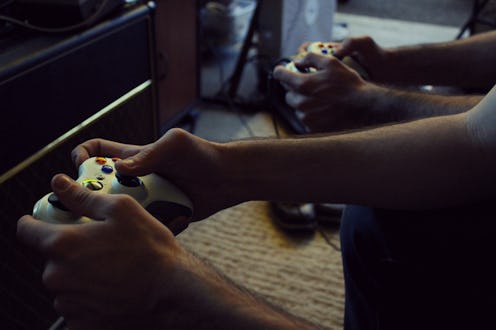
Who ever said gaming could only rot your brain? To the opposite end, two high school girls created a game that puts our minds to work: The Bias Breaker video game challenges stereotypes through diverse characters and the goal of shooting green blobs that represent stereotypes like "bisexuals are confused" and "all Asians are good at math." The creators, Shazmin and Jaymi, started the project during a Girls Who Code summer program and are still developing it. Shazmin told Buzzfeed,
When thinking of a problem to address with our game, the first thing that came to us was the lack of diversity in media... We thought it would be funny if we took ‘breaking stereotypes’ in a literal sense.
As I learned from several women who run tech companies, one advantage to breaking down barriers to diversity in tech is that marginalized groups are often interested in both combatting discrimination in their own industry and creating products that further equality on a broader scale. Shazmin and Jaymi are no exception.
“I believe video games are another form of art. But for it to be seen that way we should be educating people of its potential,” Jaymi told Buzzfeed. Here are a few other games that are also making a positive social impact:
1. Decisions That Matter
Graduate students at Carnegie Melon created a choose-your-own-adventure game that presents several fictional but realistic scenarios in which players are given the choice to intervene. First, a group of college women confronts a street harasser, and you decide whether to say anything or not. Then, one of the characters is touched by a classmate in a way that seems questionable at lunch, and finally, the same guy tries to take things too far with her on the dance floor at a party. If you intervene (as I chose to), the cartoon characters morph into actors and speak to you. "A lot of other guys could use the same help that you gave me," says the guy from the party, and the girl thanks you for stopping the situation from escalating. You'll have to play to learn what happens if you don't stand up for her. This game helps players see how much our decisions as bystanders really do matter.
2. Final Girls
Based on the term for the last woman standing to confront the villain in a horror film, this game by Kanane Jones takes place inside a support group for women from popular movies who have faced varying types of trauma including bullying and stalking. You can assume the roles of different women throughout the game and elect to open up about your struggles or keep them to yourself. Through the ensuing discussion, players learn about coping strategies for trauma and are awarded points based on how much they choose to share.
3. Tampon Run
Like Shazmin and Jaymi, Tampon Run creators Andrea Gonzales and Sophie Houser met through Girls Who Code in high school. Instead of the usual guns and grenades, the game's protagonist hurls tampons at her enemies. "We don't think it's right that guns and violence have become so normal through games, yet menstruation is completely unspeakable," Houser told CBS News. "I had a guy friend that would shut down whenever we would talk about menstruation... When he played the game he realized that and said, it doesn't make sense to do that."
4. Long Story
Long story lets teens navigate relationships in a queer-positive, gender-diverse setting. The game takes place inside a school, where players encounter love interests, friends, and enemies and choose how to behave toward them. The app's description reads: "If you work up the nerve to ask your crush on a date, there are five romanceable characters in LongStory: Two girls, two boys, and one… well, you’ll have to wait and see. It's gonna be a long story."
5. Parable Of The Polygons
Created by Vi Hart and Nicky Case and based off game theory, Parable of the Polygons teaches players "how small individual biases can become large institutional biases." All the polygons in the game prefer to be where at least a third of their neighbors look like them. As you drag the shapes to accommodate this preference, however, you realize that this is impossible without completely segregating them. Obviously, this isn't really about triangles and squares; it's a metaphor for the segregation that occurs between humans of different cultures or ethnicities. At the end, the game lays it out for you: "If you're all triangles, you're missing out on some amazing squares in your life — that's unfair to everyone. Reach out, beyond your immediate neighbors."
You can find more socially conscious games over at the Games for Change website.
Images: Mikal Marquez/Flickr; Decisions that Matter; Final Girls; Parable Of The Polygons